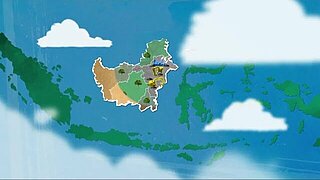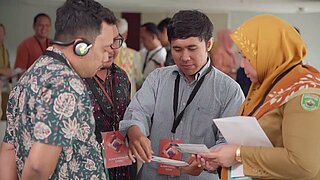Innovation Regions for a Just Energy Transition
The global energy transition away from coal to renewable energy is threatening local livelihoods, economic activities and jobs, but also holding opportunities for sustainable, low carbon development. The project aims at supporting key stakeholder of coal regions to plan for and implement regional just energy transition pathways away from coal and towards a low-carbon energy system. Focusing on the regional economic transformations, the project works with government, industry, unions, communities, civil society, and academia. It supports interregional peer-to-peer exchange, learning, and policy dialogue in an international network and information sharing via a knowledge hub. In Indonesia, it supports the development of specific transition plans in two coal regions. In Colombia, it supports the development of the concept and framework for energy communities and the implementation of just and inclusive energy communities in César and la Guajira.
- Countries
- Chile, Colombia, Indonesia, Mongolia, South Africa, Thailand, Viet Nam
- IKI funding
- 19,992,605.25 €
- Included preparation phase
- 598,258.25 €
- Duration
- 04/2022 till 01/2027
- Status
- open
- Implementing organisation
- Deutsche Gesellschaft für Internationale Zusammenarbeit (GIZ) GmbH - Deutschland
- Political Partner
-
- Diverse climate change relevant institutions in the respective partner countries/Diverse klimarelevante Institutionen in den entsprechenden Partnerländern
- Ministry of Industry and Trade (MOIT) - Viet Nam
- Ministry of Mining and Energy (MinEnergia) - Colombia
- Mpumalanga Department of Economic Development and Tourism (DEDT)
- State Ministry of National Development Planning (BAPPENAS) - Indonesia
- Implementing Partner
-
- Climate Action Network (CAN)
- International Institute for Sustainable Development (IISD)
- International Labour Organisation (ILO) - Switzerland
- Wuppertal Institute for Climate, Environment and Energy GmbH - Germany
- Online
State of implementation/results
- The official regional long-term development plan for South Sumatra (SS) and East Kalimantan (EK) incorporates elements of green economy diversification and transformation (including ambitious 2045 Renewable Energy targets i.e., 79% for EK and 74% for SS), active labour market policies and social protection, and promotes inclusive and transparent public decision making.
- The Regional Consultation Forum (RCF) for East Kalimantan and South Sumatra was officially established by a governor decree in each region This multistakeholder forum aims to guide the region through the phase-out of coal, focusing on sustainable alternatives and the well-being of local communities.
- The Acting Governor of East Kalimantan has formed a multi-stakeholder process to revise the regional energy plan and elaborate on the operationalisation strategy of the ambitious transition.
- As a result of the project's training sessions in Indonesia, partner unions have identified 10 key issues related to the impacts and opportunities of the coal transition. These issues will be discussed with stakeholders in the RCF and integrated into ongoing collective bargaining negotiations with employers in five coal districts. One such negotiation has resulted in an agreement to establish a bipartite Just Transition Committee, providing a platform for communication and consultation. This committee aims to support sustainable industrial relations, business growth, and decent work for workers in the context of the energy transition.
- In October 2024, 34 stakeholders from Colombia and Chile were trained on Just Energy Transition (JET) Foundations. The course aimed to enhance their capacity to contribute to local, subnational, and national JET processes, featuring interactive learning and regional expertise.
- The International Forum for Coal Regions in Transition 2024 in South Africa focused on knowledge sharing for regions transitioning from coal dependency. It brought together policymakers, experts, business and community leaders to discuss sustainable alternatives, energy diversification, and inclusive policies for affected workers. Participants identified best practices for energy transition, improved international collaboration, and strengthening of national policies.
- A study tour in November 2024 brought together 25 participants from the project’s target regions to explore South Africa's Just Energy Transition in Mpumalanga. The focus was on transitioning from coal, with an emphasis on renewable energy, skill-building, and community involvement. Discussions centred around creating green jobs and ensuring policies are in place for an equitable and sustainable energy future.
- A National High-Level Policy Dialogue on Just Energy Transition of Thailand's Coal Regions was held in December 2024 at the Thai Parliament, hosted by the Standing Committee on Energy. It emphasized policy strategies to support the transition to sustainable energy, involving local communities in decision-making. For the first time, national consultations involved all key stakeholders including major industrial coal consumers. A temporary subcommittee for JET in the coal sector was created.
- In December 2024, 32 stakeholders from the project’s partner countries were trained on job-rich local economic development strategies for coal regions. The course focused on just transition, economic diversification, and gender-sensitive planning, aiming to enhance participants' skills in local development and strengthen cross-country collaboration.
Latest Update:
04/2025
Project relations
Legend:
The link has been copied to the clipboard








![[Translate to English:]](/fileadmin/_processed_/7/2/csm_20241213_RE_Anlage_Dach_Privatsektor_Initiative_BMWK_2b2c722b5a.jpg)



